|
|
|
Sort Order |
|
|
|
Items / Page
|
|
|
|
|
|
|
| Srl | Item |
| 1 |
ID:
146415
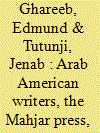

|
|
|
|
|
| Summary/Abstract |
This article reviews the attitudes of leading Arab Americans, as expressed in the Arab press in the United States (Sahafat Al-Mahjar as well as various anthologies in Arabic or English) toward Palestine, the Balfour Declaration, and the idea of a Jewish home in Palestine. The noted literary figure Mikhail Naimy sounded the alarm in 1915 (two years before the Balfour Declaration was issued) that moves were afoot to convert Palestine into a Jewish state, at the expense of the Palestinians, who, to his surprise, were strangely silent on the issue at the time. Another celebrated man of letters, Amin Rihani, was deeply engaged with the subject, and looked for avenues of reconciliation with variants of Zionism, except for “state-Zionism.” Rihani and others rose to the defense of Palestinians, particularly when they came under attack in the US press. Interestingly, one can trace an evolution in the thinking of the best writers among Arab Americans from total rejection of the Balfour Declaration toward the acceptance of a Jewish home in Palestine so long as it did not aspire to transform this haven (which appeared to have come into existence by the late thirties) from a refuge into a Jewish state.
|
|
|
|
|
|
|
|
|
|
|
|
|
|
|
|
| 2 |
ID:
156855
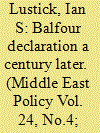

|
|
|
|
|
| Summary/Abstract |
The 2017 centennial of the Balfour Declaration has been observed with great fanfare. The theme of the 2017 annual meeting of the Association for Israel Studies was “A Century after Balfour: Vision and Reality.” In February 2017, Israeli Prime Minister Benjamin Netanyahu exulted in the British government's invitation to him to attend its celebration of the centenary: “While the Palestinians want to sue Britain for the Balfour Declaration, the British prime minister is inviting the Israeli prime minister to an event to mark the hundredth anniversary of the declaration. That speaks volumes.” Israel reciprocated by inviting the royal family to visit the Jewish state to honor the anniversary of the declaration.
|
|
|
|
|
|
|
|
|
|
|
|
|
|
|
|
| 3 |
ID:
117113
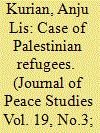

|
|
|
| 4 |
ID:
158815
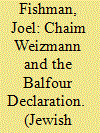

|
|
|
|
|
| Summary/Abstract |
As we approach the hundredth anniversary of the Balfour Declaration on November 2, 2017, we must remember the magnificent political victory of Dr. Chaim Weizmann who paved the way for Jewish resettlement of Land of Israel under a British protectorate and with this accomplishment brought the Jewish people onto the stage of world politics. Some years later, the League of Nations Mandate of July 24, 1922, transformed the Balfour Declaration “from a policy position into an international legal obligation accepted by the international community as a whole.”
|
|
|
|
|
|
|
|
|
|
|
|
|
|
|
|
| 5 |
ID:
119458


|
|
|
|
|
| Publication |
2013.
|
| Summary/Abstract |
The article examines the genesis, in the late 1910s and early 1920s, of the current Zionist periodization, which separated the early decades of Zionist history into distinct immigration waves [Aliyot], and numbered them from the first to the fifth. The anticipated mass immigration to Palestine right after the Balfour Declaration was numbered the "Third Aliya", following the two biblical immigrations from Babylonia. Later, the linguistic convention of the "Third Aliya" was changed from a long-range perception of history to a short-range one, and two preceding immigration waves were retrospectively pinpointed in the late Ottoman era. The new periodization was disseminated in the Yishuv during the 1920s, when the sequence of immigration waves was extended with the beginning of the Fourth Aliya in 1924. The new Zionist periodization established the concept of Aliya as the measure for assessing Zionist history, employing a judgmental distinction between the oleh driven by nationalist motives, contrasted with the Mehager whose concerns were personal or limited to family well-being. It thereby explains the magnitude of the pioneer ethos in the middle class Yishuv society, and demonstrates the political, cultural, and social implications of linguistic processes.
|
|
|
|
|
|
|
|
|
|
|
|
|
|
|
|
| 6 |
ID:
158811


|
|
|
|
|
| Summary/Abstract |
For long I have been a convinced Zionist,” said Lord Balfour on July 12, 1920 at a meeting at the Royal Albert Hall in London held by the English Zionist Federation under the chairmanship of Lord Rothschild to celebrate the conferment of the League of Nations Mandate for Palestine on Great Britain, and the incorporation of the Balfour Declaration into the San Remo Declaration in April. The latter formed part of the Treaty of Sèvres signed with Turkey in August 1920. “Who would have thought five or six years ago that a speaker at the Albert Hall would be able to recount as an established fact that the Great Powers of the world had elected to accept the Declaration … had consented to give a Mandate to the country which at all events is in the forefront among those who desire to see this policy brought to a successful issue. … These are happy results, these are results on which we may all congratulate ourselves.”
|
|
|
|
|
|
|
|
|
|
|
|
|
|
|
|
| 7 |
ID:
158810


|
|
|
|
|
| Summary/Abstract |
The stated purpose of the Balfour Declaration from November 2, 1917 and the circumstances under which it was published are generally known.1 The most common explanation was that Britain and the Allied Powers were moved by idealism and their interests. At a critical point in the First World War, the British cabinet needed to secure world Jewish support for the Allied cause and hoped at the same time to keep both the United States and Russia on their side. With time, however, the world’s understanding of the Declaration has become the subject of bitter controversy and revisionist interpretation. In fact, the Palestinian Authority of today went so far as to call it a “crime.”2
|
|
|
|
|
|
|
|
|
|
|
|
|
|
|
|
| 8 |
ID:
158814


|
|
|
|
|
| Summary/Abstract |
This brief paper will discuss a major legal issue related to the Balfour Declaration. Scholars and politicians have devoted much attention the following questions: Is it a binding declaration? Does it contradict the MacMahon-Hussein correspondence of 1915-1916, which promised independence to the Arabs? What is the meaning of the term, “National Home”? What is the meaning of the term “in Palestine”? Does it mean in all of Palestine? While the above are interesting questions, I prefer to address an issue which does not appear to have been a topic of intensive study, namely, is the Balfour Declaration a text which is legally binding?
|
|
|
|
|
|
|
|
|
|
|
|
|
|
|
|
| 9 |
ID:
027161
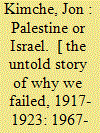

|
|
|
|
|
| Publication |
London, Secker and Warburg, 1973.
|
| Description |
xx, 360p.hbk
|
| Standard Number |
436233827
|
|
|
|
|
|
|
|
|
|
|
|
Copies: C:1/I:0,R:0,Q:0
Circulation
| Accession# | Call# | Current Location | Status | Policy | Location |
| 012827 | 956.94/KIM 012827 | Main | On Shelf | General | |
|
|
|
|
| 10 |
ID:
044141
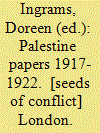

|
|
|
|
|
| Publication |
London, John Murray, 1972.
|
| Description |
xii,198p.: ill., mapshbk
|
| Standard Number |
0719526388
|
|
|
|
|
|
|
|
|
|
|
|
Copies: C:1/I:0,R:0,Q:0
Circulation
| Accession# | Call# | Current Location | Status | Policy | Location |
| 010925 | 956.9404/ING 010925 | Main | On Shelf | General | |
|
|
|
|
| 11 |
ID:
073305


|
|
|
|
|
| Publication |
London, Pluto Press, 2006.
|
| Description |
xviii, 216p.pbk
|
| Standard Number |
0745325475
|
|
|
|
|
|
|
|
|
|
|
|
Copies: C:1/I:0,R:0,Q:0
Circulation
| Accession# | Call# | Current Location | Status | Policy | Location |
| 051583 | 956.953044/BAR 051583 | Main | On Shelf | General | |
|
|
|
|
| 12 |
ID:
178534
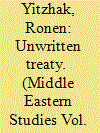

|
|
|
| 13 |
ID:
102849


|
|
|
|
|
| Publication |
2011.
|
| Summary/Abstract |
Rejecting deterministic views of the 1917 Balfour Declaration as an expression of the inevitable work of history returning Jews to their ancient homeland, this article argues that Britain's fateful endorsement of the idea of a national home for Jews in Palestine was, in fact, the result of a combination of fortuity and contingency related primarily to World War I and the concerns and personalities of the British politicians involved. The article highlights the historic improbability of the Declaration and its implementation in the League of Nations Mandate for Palestine, noting the regression it represented at a time when British imperial policy aspired to more flexible accommodations with colonial populations.
|
|
|
|
|
|
|
|
|
|
|
|
|
|
|
|
| 14 |
ID:
089573


|
|
|
|
|
|
|
|